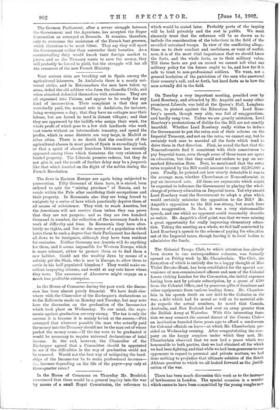In the House of Commons during the past week the
discus- sion has been almost purely financial. We have dealt else- where with the Chancellor of the Exchequer's declarations as to the Zollverein made on Monday and Tuesday, but may note here the discussion on the graduation of the Income-tax which took place on Wednesday. To our mind, the argu- ments against graduation are very strong. The tax is only the success it is because it is mainly levied at the source.—Pitt arranged that wherever possible the man who actually paid the money into the Treasury should not be the man out of whose pocket the money came.—If the tax were to be graduated it would be necessary to require universal declarations of total income. In the end, however, the Chancellor of the Exchequer agreed that a Committee should be appointed to see if the difficulties in the way of graduation could not be removed. Would not the best way of mitigating the hard- ships of the Income-tax be to make professional incomes- i.e., incomes depending on the life of the payer—pay only at three-quarter rates?










































 Previous page
Previous page